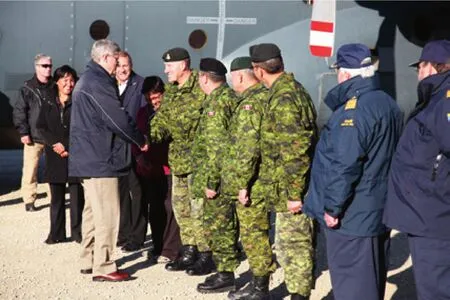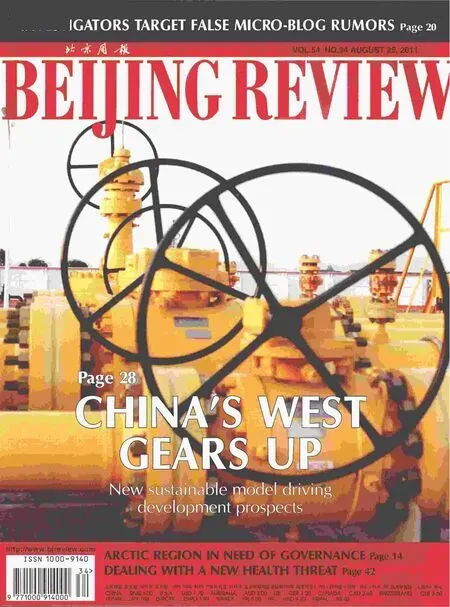Arctic Aspirations
By CHENG BAOZHI
Arctic Aspirations
By CHENG BAOZHI
The world community needs to improve the governance of the North Pole for the benefit of all


ZHANG DACHENG
As climate change hastens the disappearance of the Arctic ice cap, global players including sovereign states, international organizations and multinational corporations are beginning to take greater interest in the northernmost part of the planet.
The Arctic presents business opportunities for commercial shipping, oil and gas exploration, mineral exploitation as well as fshing and tourism. As a result of this potential, the Arctic’s geopolitical signifcance has increased.
In this context, Arctic governance, which aims to promote the sustainable development of the Arctic, has been thrust into the global spotlight. The ongoing scramble for shipping routesand natural resources in the region has made it imperative to improve its governance.
Flawed arrangements
Arctic governance is not a new concept. Existing arrangements include global policy frameworks such as the UN Convention on the Law of the Sea (UNCLOS) and the UN Framework Convention on Climate Change (UNFCCC), as well as regional agreements on the establishment of the Arctic Council and the Barents Euro-Arctic Council. The International Maritime Organization (IMO) has also adopted navigation rules for the Arctic such as the Guidelines for Ships Operating in Arctic Ice-Covered Waters.
These arrangements, however, are riddled with faws. For instance, the UNCLOS, which puts forward general principles on the law of the sea, does not address specifc issues pertinent to the Arctic, such as scientifc research, resource development, fshing and environmental protection. Worse still, some of the UNCLOS’ provisions on the outer continental shelf beyond 200 nautical miles may add fuel to the rush for Arctic resources.
The UNFCCC also lacks provisions especially designed to protect the Arctic environment. The ecological environment in the Arctic, however, is so vulnerable that any damage would be virtually irreversible and stricter protection measures are an urgent necessity.
Moreover, the United States’ absence from the UNCLOS, the Stockholm Convention on Persistent Organic Pollutants and the Kyoto Protocol of the UNFCCC has undermined the universality and authority of these documents. The soft laws enacted by the IMO and the Arctic Council, which are not legally binding, cannot be effectively enforced.
While focusing on scientific research, environmental protection and sustainable development, the eight-member Arctic Council gives short shrift to political and military issues. Regional arrangements are also unable to solve trans-regional environmental and climate issues or global issues concerning the Arctic, including navigation and energy.
In a nutshell, a politically valid and legally binding Arctic governance system has yet to be established. Also absent in the Arctic is a mechanism that can promote all-round regional development and help countries reach agreements on its resources and shipping routes.
A global topic
The Arctic states, of course, should have a greater say in Arctic governance. Other countries also have the right to take part in discussions in accordance with international conventions such as the Svalbard Treaty and the UNCLOS. A few Arctic states, however, tend to monopolize Arctic affairs and reject other countries’ participation. In recent years, they have strengthened coordination in an attempt to shut the door on non-Arctic states’ involvement.
For instance, Russia, Canada, the United States, Denmark and Norway, known as the“Arctic Five,” have reaffirmed their pledge to address disputes over outer continental shelf demarcation peacefully in keeping with international law. These countries hope to fnd ways to resolve or partially resolve their disputes through cooperation. In April 2010, Norway and Russia reached an agreement on their shared borders in the Barents Sea and the Arctic Ocean, which underlined the importance of cooperation and observance of the international maritime law.
At the Seventh Arctic Council Ministerial Meeting in May 2011, the council adopted the Agreement on Cooperation on Aeronautical and Maritime Search and Rescue in the Arctic, the frst legally binding agreement since the council was established in 1996. This progress was attributable to policy coordination among major Arctic states such as the United States and Russia.
The meeting’s fnal document also stated countries intending to become observers at the Arctic Council must recognize council members’ sovereignty and jurisdiction over the Arctic. Observers’ rights are limited to participation in scientifc research in the region and the contribution of funds for certain projects. By restricting observers’ rights and modifying observer application procedures, the Arctic Council has raised the political threshold for non-Arctic states to participate in Arctic governance.
But pressing trans-regional issues such as Arctic navigation, resource development and environmental protection necessitate cooperation between both Arctic and non-Arctic states. It is unimaginable that non-Arctic states will remain users of Arctic shipping routes and consumers of Arctic energy without playing a role in the decision-making process, and an end to the Arctic states’ monopoly of Arctic affairs is now imperative.
China, India, Japan, South Korea and the EU have made strong appeals for participation in Arctic affairs. Although the Arctic states are unlikely to share their leadership and decisionmaking power with other countries in the foreseeable future, the need to work together with non-Arctic states will grow.
An active player
China supports the UNCLOS and other international conventions governing the Arctic. At the same time, it is fully aware that the current governance system has not resolved disputes in the Arctic and takes the position that many aspects of the system need to be amended in light of specifc problems in the region.
China has closely followed the disputes among the Arctic states over outer continental shelf demarcation. It has called on the countries concerned to settle disputes based on the UNCLOS and scientifc data so as not to allow lingering conficts to hinder progress in international cooperation in the Arctic.
While demarcating their outer continental shelves, these countries should not only handle relations with neighboring Arctic states in a proper way but also take the Arctic’s importance to mankind into consideration. The Arctic states should strike a balance between their national interests and the common interests of the international community.
China is of the view the world community should devise more focused rules on navigation safety and environmental protection in the Arctic based on current conventions. In terms of redressing defects in the current Arctic governance system, China will play a critical role given its extensive interests in Arctic research, environmental protection, resource exploration and navigation.
It will intensify Arctic expedition efforts while engaging in the discussions of topical issues such as navigation, environmental protection, tourism and resource exploration.
China plans to make itself heard before arrangements are made, so that its views can be incorporated into any arrangements. To that end, it will strengthen cooperation and exchanges with North European countries such as Iceland, Norway and Sweden. As a major developing country, China will give prominence to mankind’s common interests and shared concerns in its proposals on Arctic governance.
China has recently unveiled a plan for polar expedition from 2011 to 2015 and launched a number of research projects—moves that are expected to give a boost to its polar studies program. Chinese researchers will reach out to leading scholars worldwide for academic exchanges. All these efforts aim to help shape a medium- and long-term development strategy for the Arctic.
The Arctic Council
The Arctic Council was established as a high-level intergovernmental forum in 1996. It provides a means for promoting cooperation, coordination and interaction among the Arctic states, with the involvement of the Arctic indigenous communities and other Arctic inhabitants on common Arctic issues, in particular issues of sustainable development and environmental protection.
Member states
Canada, Denmark (including Greenland and the Faroe Islands), Finland, Iceland, Norway, Sweden, Russia and the United States
Permanent observer states
France, Germany, the Netherlands, Poland, Spain and the UK
(Source:www.arctic-council.org)
The author is an assistant research fellow with the Shanghai Institutes for International Studies

